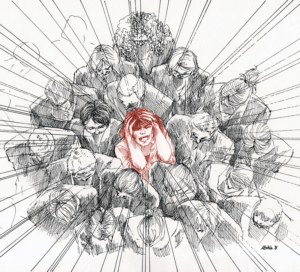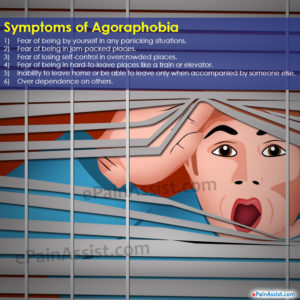What is Agoraphobia:
Agoraphobia (ag-uh-ruh-FOE-be-uh) is a type of anxiety disorder in which you fear and avoid places or situations that might cause you to panic and make you feel trapped, helpless or embarrassed. You fear an actual or anticipated situation, such as using public transportation, being in open or enclosed spaces, standing in line, or being in a crowd.
The anxiety is caused by fear that there’s no easy way to escape or get help if the anxiety intensifies. Most people who have agoraphobia develop it after having one or more panic attacks, causing them to worry about having another attack and avoid the places where it may happen again.
People with agoraphobia often have a hard time feeling safe in any public place, especially where crowds gather. You may feel that you need a companion, such as a relative or friend, to go with you to public places. The fear can be so overwhelming that you may feel unable to leave your home.
Agoraphobia treatment can be challenging because it usually means confronting your fears. But with psychotherapy and medications, you can escape the trap of agoraphobia and live a more enjoyable life.
How Agoraphobia is Diagnosed:
- Signs and symptoms
- In-depth interview with your doctor or a mental health professional
- Physical exam to rule out other conditions that could be causing your symptoms
- Criteria for agoraphobia listed in the Diagnostic and Statistical Manual of Mental Disorders (DSM-5), published by the American Psychiatric Association
Treatments for Agoraphobia :
Agoraphobia treatment usually includes both psychotherapy and medication. It may take some time, but treatment can help you get better.
1.) Psychotherapy
Psychotherapy involves working with a therapist to set goals and learn practical skills to reduce your anxiety symptoms. Cognitive behavioral therapy is one of the most effective forms of psychotherapy for anxiety disorders, including agoraphobia.
Generally a short-term treatment, cognitive behavioral therapy focuses on teaching you specific skills to better tolerate anxiety, directly challenge your worries and gradually return to the activities you’ve avoided because of anxiety. Through this process, your symptoms improve as you build on your initial success.
You can learn:
- What factors may trigger a panic attack or panic-like symptoms and what makes them worse
- How to cope with and tolerate symptoms of anxiety
- Ways to directly challenge your worries, such as the likelihood of bad things happening in social situations
- That your anxiety gradually decreases if you remain in situations and that you can manage these symptoms until they do
- How to change unwanted or unhealthy behaviors through desensitization, also called exposure therapy, to safely face the places and situations that cause fear and anxiety
If you have trouble leaving your home, you may wonder how you could possibly go to a therapist’s office. Therapists who treat agoraphobia are well aware of this problem.
If you feel homebound due to agoraphobia, look for a therapist who can help you find alternatives to office appointments, at least in the early part of treatment. He or she may offer to see you first in your home or meet you in what you consider a safe place (safe zone). Some therapists may also offer some sessions over the phone, through email, or using computer programs or other media.
If the agoraphobia is so severe that you cannot access care, you might benefit from a more intensive hospital program that specializes in the treatment of anxiety.
You may want to take a trusted relative or friend to your appointment who can offer comfort, help and coaching, if needed.
2.) Medications
Certain types of antidepressants are often used to treat agoraphobia, and sometimes anti-anxiety drugs are used on a limited basis. Antidepressants are more effective than anti-anxiety medications in the treatment of agoraphobia.
- Antidepressants. Certain antidepressants called selective serotonin reuptake inhibitors (SSRIs), such as fluoxetine (Prozac) and sertraline (Zoloft), are used for the treatment of panic disorder with agoraphobia. Other types of antidepressants may also effectively treat agoraphobia.
- Anti-anxiety medication. Anti-anxiety drugs called benzodiazepines are sedatives that, in limited circumstances, your doctor may prescribe to temporarily relieve anxiety symptoms. Benzodiazepines are generally used only for relieving acute anxiety on a short-term basis. Because they can be habit-forming, these drugs aren’t a good choice if you’ve had long-term problems with anxiety or problems with alcohol or drug abuse.
It may take weeks for medication to relieve symptoms. And you may have to try several different medications before you find one that works best for you.
Both starting and ending a course of antidepressants can cause side effects that create uncomfortable physical sensations or even panic attack symptoms. For this reason, your doctor likely will gradually increase your dose during treatment, and slowly decrease your dose when he or she feels you’re ready to stop taking medication.
3,) Alternative medicine
Certain dietary and herbal supplements claim to have calming and anti-anxiety benefits. Before you take any of these for agoraphobia, talk with your doctor. Although these supplements are available without a prescription, they still pose possible health risks.
For example, the herbal supplement kava, also called kava kava, appeared to be a promising treatment for anxiety, but there have been reports of serious liver damage, even with short-term use. The Food and Drug Administration has issued warnings but not banned sales in the United States. Avoid using any product that contains kava until more-rigorous safety studies are done, especially if you have liver problems or take medications that affect your liver.

